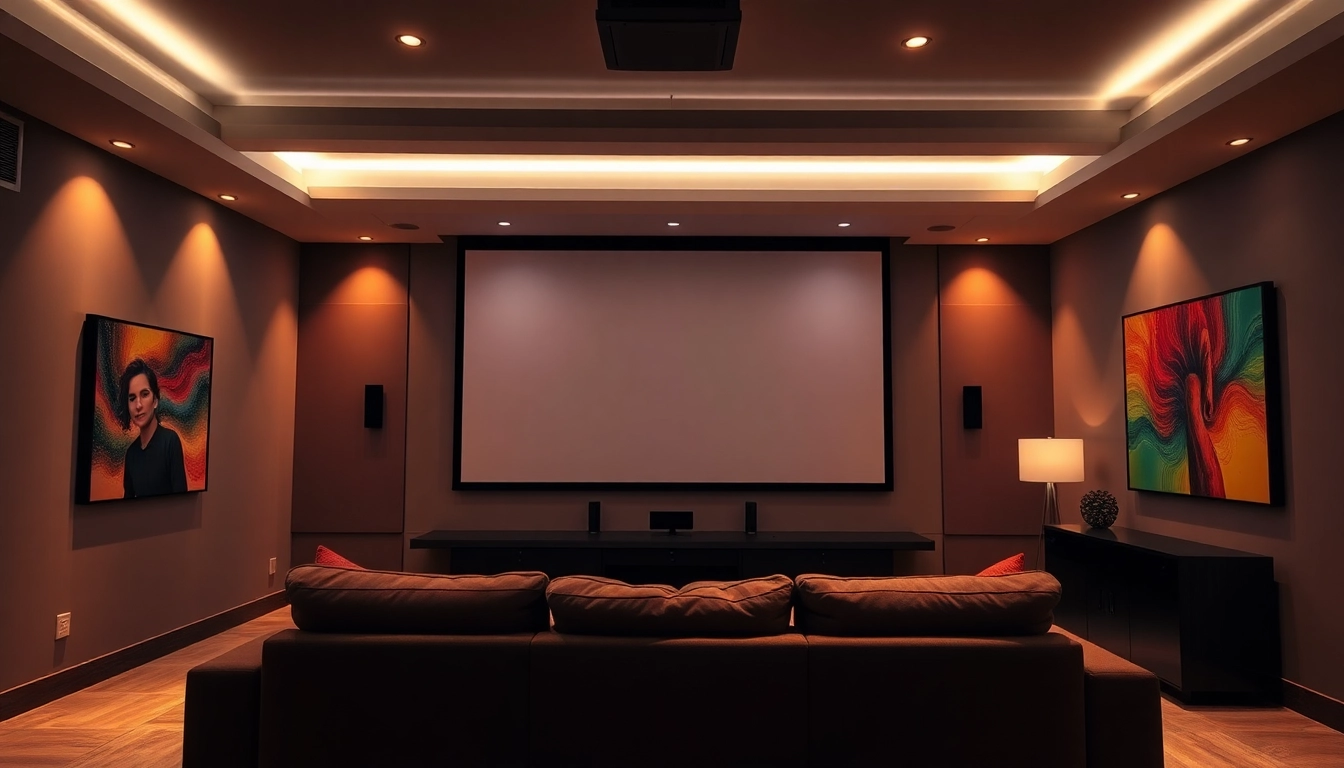Understanding Projection Screens
What is a Projection Screen?
A projection screen serves as a surface onto which images and videos are projected, enhancing visual experiences in various settings such as home theaters, conference rooms, and classrooms. The efficacy of a project depends significantly on the quality of the screen used. Unlike plain walls or makeshift surfaces, a dedicated projection screen is designed to reflect light optimally, ensuring colors are vivid, and contrasts are sharp, contributing to an overall better viewing experience.
The Different Types of Projection Screens
Projection screens come in multiple formats, each suited to specific contexts and needs:
- Fixed Frame Screens: These screens are mounted permanently and provide a taut surface, ideal for home theaters.
- Motorized Screens: These can be easily retracted or extended with a remote control, making them suitable for multipurpose rooms.
- Portable Screens: Designed for ease of transport, these are often used in business presentations and educational settings.
- Wall-Mounted Screens: Similar to fixed frame but may feature a more flexible installation design.
- Ceiling-Mounted Screens: Ideal for spaces where wall installation is not possible or aesthetically desirable.
Benefits of Using a Quality Projection Screen
Investing in a quality projection screen offers numerous advantages:
- Enhanced Image Quality: Quality screens improve brightness, color accuracy, and detail resolution.
- Reduced Ambient Light Effects: Many screens are specially designed to minimize ambient light interference.
- Durability: A good projection screen can last many years without noticeable wear.
- Ease of Use: Modern screens, especially motorized ones, offer convenience in both setup and dismantling.
Key Factors in Selecting a Projection Screen Supplier
Quality and Material Considerations
When selecting a supplier, quality should be at the forefront of your decision-making process. The material used in the screen heavily influences its performance. Screens made of high-quality vinyl, for instance, generally provide superior color reproduction and durability. In addition, the surface finish—matte, gloss, or gain—can affect viewing angles and light diffusion, making it critical to align your choice with your specific projector type and room environment.
Supplier Reputation and Reviews
Investigating a supplier’s reputation can save you from future inconveniences. Look for reviews from previous customers and consider their feedback on product quality and customer service. Suppliers that have been in the business for a long time often showcase testimonials that can provide insights into their reliability and service effectiveness.
Customer Service and Support
Another pivotal factor is customer service. A good supplier should provide comprehensive support not only during the purchasing phase but also post-purchase. Having access to installation help and warranty services ensures that any issues can be addressed promptly, establishing peace of mind that you are backed by a reliable Projection Screen Supplier.
Popular Features to Look for in Projection Screens
Motorized vs. Manual Projection Screens
Motorized screens offer the luxury of automated control and are ideal for setups where convenience is paramount. The ability to retract and deploy the screen with a remote can significantly enhance user experience. On the contrary, manual screens are typically more affordable while also being reliable, but require manual effort to operate. The choice largely depends on application and budget.
Screen Size and Aspect Ratio
Choosing the correct screen size and aspect ratio is crucial for achieving an immersive viewing experience. Screens are available in various aspect ratios, such as 1:1, 4:3, and 16:9. Evaluating your room size, projector specifications, and viewing distance will guide you in selecting the correct dimensions to fulfill your needs.
Enhanced Viewing Technologies
In recent years, several technologies have emerged to enhance viewing experiences. For instance, ambient light-rejecting (ALR) screens are designed to minimize reflections from ambient light, making them ideal for rooms with significant natural light penetration. Some screens may also feature advanced coatings that improve contrast and enhance color perception, leading to a richer viewing experience.
How to Evaluate Projection Screen Suppliers
Comparing Pricing and Options
While price shouldn’t be the sole determining factor in your selection process, comparing prices across different suppliers ensures you understand the market rate. It’s vital to consider what features you’re getting for the price. A modestly priced screen that matches your needs can often be a better investment than a more expensive option that boasts features irrelevant to your setup.
Warranty and Return Policy Insights
A robust warranty and transparent return policy are important aspects of any purchase. Most reputable suppliers offer warranties that cover manufacturing defects for a predetermined time, effectively safeguarding your investment. Familiarizing yourself with return policies ensures that if a product doesn’t meet your expectations, you won’t have difficulties in returning it.
Expert Recommendations and Reviews
Consulting experts or credible sources for recommendations can illuminate advantages and disadvantages of various brands you may be considering. Online forums, specialized websites, and review aggregators can serve as invaluable resources. Compare insights from people who have firsthand experience with specific brands, as well as professional reviews, to make an informed choice.
Maintenance and Care for Your Projection Screen
Cleaning and Protecting Your Screen
Proper maintenance is essential for prolonging the life of your projection screen. Regularly dusting the screen with a soft microfiber cloth prevents buildup that could affect image quality. For deeper cleaning, using a gentle solution specifically made for projection screens ensures that no damage occurs. Avoid using abrasive materials or harsh chemicals that may degrade the screen surface over time.
Common Issues and Troubleshooting
Even the best screens can encounter issues. Common problems include wrinkles, discoloration, or surface dust that obstructs the image. Depending on the issue, solutions such as applying heat to release wrinkles or using proper cleaning methods can be effective. Educational resources from your supplier can also provide guidance on troubleshooting these common challenges.
When to Replace Your Projection Screen
Knowing when to replace your screen can significantly affect the quality of your viewing experience. Signs it may be time for a replacement include significant wear and tear, discoloration that affects image quality, or if newer technology offers better performance and compatibility with your current projector. Engaging with professionals for recommendations on timing can help in making the right decision.



